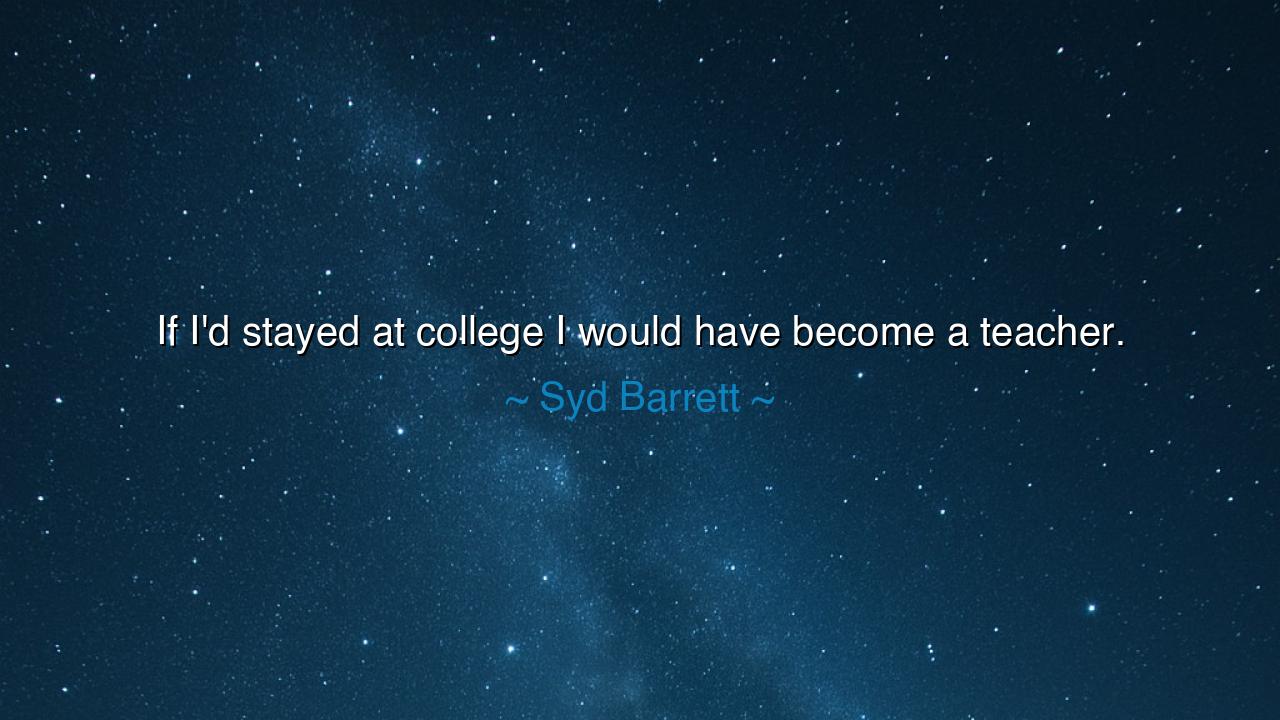
If I'd stayed at college I would have become a teacher.






Syd Barrett, the visionary musician and founder of Pink Floyd, once reflected: “If I'd stayed at college I would have become a teacher.” In this simple confession lies the echo of a path not taken, a door that might have opened had fate and choice aligned differently. Though he did not remain in the halls of study, his words carry the weight of possibility, of the forked road where one life turns toward art while another might have turned toward instruction.
The meaning of this quote is bound in the tension between destiny and decision. Barrett imagines himself as a teacher, shaping minds with knowledge, guiding students as countless mentors have done before him. Instead, he chose the path of music, becoming a teacher of another kind—one who instructed not with chalk and blackboard, but with rhythm, poetry, and sound. His reflection reminds us that within every soul lies more than one destiny, and the road we choose defines not only who we are but how we serve.
The origin of these words lies in Barrett’s own youth, when he studied art and showed promise as a scholar. Yet the fire of music pulled him away, drawing him into the world of experimentation, lyricism, and performance. He left the formal path of college, and with it, the possibility of a life of structured teaching. But even as he walked the wild road of creativity, the memory of that other path lingered, a reminder that life is always a tapestry of choices, some embraced, some abandoned.
History offers us examples of this very struggle. Consider Sir Isaac Newton, who might have lived a quiet life as a country clergyman had he not been drawn into mathematics and natural philosophy. Or Leo Tolstoy, who considered becoming a teacher of ethics and morality in the formal sense, but instead became a novelist whose books became teachers to nations. Each figure, like Barrett, reveals that one may not stand before a classroom and yet still instruct the world through another medium.
Barrett’s words also highlight the nobility of the teacher’s calling. For in imagining himself as one, he was not lowering his vision but raising it. To be a teacher is to shape the future by guiding the young; it is to dedicate oneself to the transmission of wisdom. His acknowledgment reveals that even in his brilliance as a musician, he recognized the timeless value of teaching. It is as though he sensed that no matter the path, to truly live is to share one’s gifts with others.
The lesson we may take is this: do not measure your worth only by the road you walked, but also by the wisdom you shared along the way. If life does not make you a teacher by title, you can still become one by action. In every word, every deed, every song, you may guide another. The true teacher is not confined to schools—they are found in families, in friendships, in art, in music, and in the quiet acts of kindness that instruct the heart.
Practically, this means embracing your own power to teach, no matter where you stand. Share your knowledge generously. Encourage those who are younger, or less experienced, and let your struggles become lessons for others. Do not wait for formal authority; teaching is not a position, but a way of living. Like Barrett, you may wonder about the paths you did not take, but remember: every soul has the power to be a teacher in the life they are living now.
So let Syd Barrett’s reflection ring as a gentle reminder: our lives hold many possible callings, and though we cannot walk them all, we can still embody their essence. He may not have stayed in college, but through his art he became a teacher of imagination, freedom, and daring. And so may we, in whatever paths we walk, take up the noble calling of guiding others toward light.






AAdministratorAdministrator
Welcome, honored guests. Please leave a comment, we will respond soon